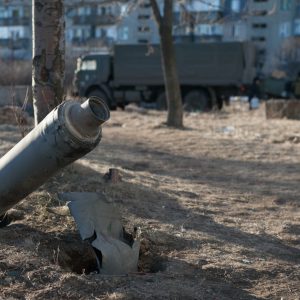Federal Water Tap, December 3: Appeals Court Cancels Mountain Valley Natural Gas Pipeline Permit
The Rundown
Mountain Valley Pipeline ruling hinges on administrative procedures and the Clean Water Act’s balance of state and federal authority. Canada, Mexico, and the United States sign an environmental cooperation agreement. Federal scientists say more investment and research is needed for short-term weather forecasts. USGS scientists study metals in Lake Powell sediment, land subsidence in Arizona and California, and estimate greenhouse gas emissions from federally managed public lands. And lastly, the National Drinking Water Advisory Council holds its annual meeting this week in Washington, D.C.
“The rapid transition from wet to dry and back again — we have little sense of how that happens.” — Roger Pulwarty, director of the National Integrated Drought Information System at NOAA. Pulwarty spoke at a National Academies of Sciences, Engineering, and Medicine meeting on short-term weather forecasting. Better forecasts weeks or months in advance are important for water supply planning and farm decisions. Pulwarty pointed to the rapid decline in soil moisture in the northern Great Plains in 2017 and the resulting drought as an example of scientific ignorance about short-term weather changes. “We don’t know why that happened,” he said.
By the Numbers
23.7 percent: Share of U.S greenhouse gas emissions in 2014 that came from extracting and burning fossil fuels that originated from federally managed public lands. It is the first such estimate of these data. (U.S. Geological Survey)
News Briefs
Appeals Court Cancels Mountain Valley Pipeline Permit
The Fourth Circuit Court of Appeals revoked the Clean Water Act permit for the Mountain Valley Pipeline, an action that, if it holds up, will most likely require the pipeline developer and government agencies to reopen the permitting process.
The heart of the lawsuit is the balance of power between state and federal agencies in carrying out the Clean Water Act. In this case: who determines the rules for constructing the 304-mile pipeline across rivers in West Virginia and how those rules are determined.
The three-judge panel agreed with the Sierra Club, one of the organizations that brought the suit, that the Army Corps erred in two ways. The Army Corps incorrectly substituted its own river-crossing conditions in place of those imposed by the West Virginia Department of Environmental Protection. The Corps thought its conditions, those they would result in a longer construction time, would better protect the river from erosion. The state agency agreed in a letter to the Corps.
However, even if the change would have resulted in less erosion, the Corps also failed to follow proper public notification and comment procedures for changing permit conditions, the judges determined.
These two errors upended the state role in water pollution regulation under the Clean Water Act, the judges argued.
“Were the Corps’ construction of the Clean Water Act accepted, the Corps could, in future, replace any state condition with an alternative condition, so long as it deemed the alternative condition more environmentally protective. We decline to sanction this level of discretionary authority that would allow the Corps, with few guardrails, to replace state-imposed conditions,” Judge James Wynn wrote.
The implication of the ruling, argues Ann Navaro, a lawyer at Bracewell who used to work for the Corps, is less flexibility in writing Clean Water Act permits.
North America Environmental Agreement
Completing a side deal within the new North America trade pact, representatives of Canada, Mexico, and the United States signed an environmental cooperation agreement.
The agreement preserves the Commission on Environmental Cooperation, a trilateral body for discussing cross-border pollution and investigating citizen complaints about enforcement of environmental statutes.
Rural Development Funding
Responding to President Trump’s order to cut red tape for infrastructure projects, the U.S. Department of Agriculture issued a final rule that allows rural development funds to be pledged before an environmental assessment is completed.
Transfer of the funds is still contingent on a completed and approved environmental review.
Studies and Reports
Environmental Justice Council to Assess Superfund
The National Environmental Justice Advisory Council, which consults with the EPA on pollution matters that affect poor and minority communities, will review the agency’s Superfund program.
The assessment’s goal, said Matthew Tejada, the head of EPA Office of Environmental Justice, is to provide recommendations to the agency’s acting administrator for how to make the Superfund process more effective, with “an eye for the site to become an asset for the community.”
Each of the 21 council members on a November 28 conference call accepted the assignment, the draft of which is posted here. Council members requested some changes to the language, but the substance is the same.
Initial recommendations are due June 1, 2019.
Land Subsidence in Arizona and California
The U.S. Geological Survey tracks sinking land due to groundwater pumping in the two states.
In southern Arizona, near Tucson, maximum subsidence between 2003 and 2016 was 5.3 inches. Overall, groundwater level declines have stabilized or reversed in most areas, thanks to imported Colorado River water, which is used to recharge the basin.
In the western region of California’s San Joaquin Valley, researchers assessed subsidence from 2003 to 2010 along 90 miles of the California Aqueduct, the main north-south, state-operated canal. Most sinking occurred near parts of the canal that are closer to the valley’s center.
Lake Powell Sediment Study
The U.S. Geological Survey and state and federal partners began taking core samples from Lake Powell this month for a study of metals in reservoir sediment.
The study will inform how water level changes, floods, and mining activities upstream affect water quality in the Colorado River reservoir.
Initial results are expected in 2020.
On the Radar
NDWAC Meeting
The expert council that advises the EPA on drinking water policy will hold a meeting in Washington, D.C. on December 6 and 7. You have to be there to see it. The meeting is not being webcast or teleconferenced.
To attend, email ward.tracey@epa.gov with the subject line NDWAC 2018 Attendee. Include your name, address, and phone number.
Here is the agenda, which covers unregulated contaminants, loans and grants, and technical assistance.
Federal Water Tap is a weekly digest spotting trends in U.S. government water policy. To get more water news, follow Circle of Blue on Twitter and sign up for our newsletter.
Brett writes about agriculture, energy, infrastructure, and the politics and economics of water in the United States. He also writes the Federal Water Tap, Circle of Blue’s weekly digest of U.S. government water news. He is the winner of two Society of Environmental Journalists reporting awards, one of the top honors in American environmental journalism: first place for explanatory reporting for a series on septic system pollution in the United States(2016) and third place for beat reporting in a small market (2014). He received the Sierra Club’s Distinguished Service Award in 2018. Brett lives in Seattle, where he hikes the mountains and bakes pies. Contact Brett Walton






Leave a Reply
Want to join the discussion?Feel free to contribute!